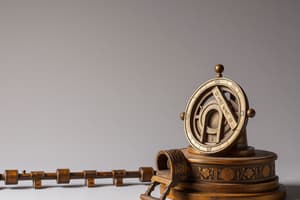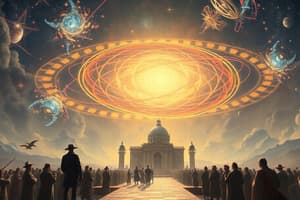Podcast
Questions and Answers
Who is known as the father of modern philosophy and analytical geometry?
Who is known as the father of modern philosophy and analytical geometry?
- Francis Bacon
- Isaac Newton
- Rene Descartes (correct)
- Ptolemy
Johannes Kepler discovered the laws of planetary motion.
Johannes Kepler discovered the laws of planetary motion.
True (A)
What is the period marked by great advances in the sciences from the 16th through the 18th century called?
What is the period marked by great advances in the sciences from the 16th through the 18th century called?
Scientific Revolution
The ____ model of the universe was widely accepted until the Scientific Revolution.
The ____ model of the universe was widely accepted until the Scientific Revolution.
Match the individuals with their accomplishments:
Match the individuals with their accomplishments:
Who among the following developed the laws of motion and universal gravitation?
Who among the following developed the laws of motion and universal gravitation?
The Scientific Revolution occurred in the 14th century.
The Scientific Revolution occurred in the 14th century.
Who is known as the father of modern philosophy and analytical geometry?
Who is known as the father of modern philosophy and analytical geometry?
The __________ places the Sun at the center of the solar system.
The __________ places the Sun at the center of the solar system.
Match the individuals with their contributions:
Match the individuals with their contributions:
Flashcards are hidden until you start studying
Study Notes
Scientific Revolution
- Occurred from the 16th to the 18th century, marking the emergence of modern science
- Characterized by great advances in sciences during this period
Key Figures
- Isaac Newton: English mathematician, physicist, astronomer, and author who formulated laws of motion and universal gravitation
- Copernicus: Renaissance-era polymath who formulated a heliocentric model of the universe, placing the Sun at its center
- Galileo: Italian astronomer, physicist, and engineer who made pioneering observations, laying the foundation for modern physics and astronomy
- Francis Bacon: English philosopher and statesman who developed the scientific method
- Johannes Kepler: German astronomer who discovered the laws of planetary motion
- Rene Descartes: French philosopher, mathematician, and scientist, dubbed the father of modern philosophy and analytical geometry
- Ptolemy: Ancient Greek geographer, mathematician, and astronomer whose geocentric model of the universe was widely accepted until the Scientific Revolution
Important Concepts
- Heliocentric model: Places the Sun at the center of the solar system with planets orbiting around it
- Geocentric model: Places Earth at the center of the universe with the Sun, Moon, and stars revolving around it
- Secular: Denotes attitudes, activities, or things with no religious or spiritual basis
- Excommunication: Officially excluding someone from participation in Christian Church sacraments and services
Significant Inventions
- Printing Press: Invented by Johannes Gutenberg in the 15th century, a machine for printing text or pictures from type or plates
Scientific Method
- A systematic procedure for collecting and analyzing evidence
- Involves observation, experimentation, and the formulation and testing of hypotheses
Scientific Revolution
- Occurred from the 16th to the 18th century, marking the emergence of modern science
- Characterized by great advances in sciences during this period
Key Figures
- Isaac Newton: English mathematician, physicist, astronomer, and author who formulated laws of motion and universal gravitation
- Copernicus: Renaissance-era polymath who formulated a heliocentric model of the universe, placing the Sun at its center
- Galileo: Italian astronomer, physicist, and engineer who made pioneering observations, laying the foundation for modern physics and astronomy
- Francis Bacon: English philosopher and statesman who developed the scientific method
- Johannes Kepler: German astronomer who discovered the laws of planetary motion
- Rene Descartes: French philosopher, mathematician, and scientist, dubbed the father of modern philosophy and analytical geometry
- Ptolemy: Ancient Greek geographer, mathematician, and astronomer whose geocentric model of the universe was widely accepted until the Scientific Revolution
Important Concepts
- Heliocentric model: Places the Sun at the center of the solar system with planets orbiting around it
- Geocentric model: Places Earth at the center of the universe with the Sun, Moon, and stars revolving around it
- Secular: Denotes attitudes, activities, or things with no religious or spiritual basis
- Excommunication: Officially excluding someone from participation in Christian Church sacraments and services
Significant Inventions
- Printing Press: Invented by Johannes Gutenberg in the 15th century, a machine for printing text or pictures from type or plates
Scientific Method
- A systematic procedure for collecting and analyzing evidence
- Involves observation, experimentation, and the formulation and testing of hypotheses
Studying That Suits You
Use AI to generate personalized quizzes and flashcards to suit your learning preferences.




